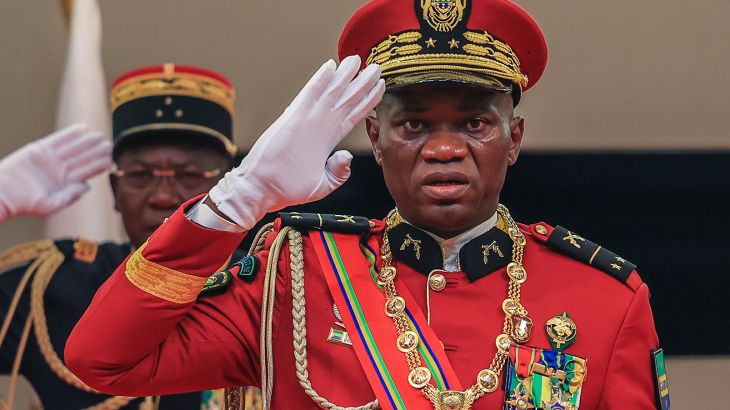Gabon coup leader Nguema sworn in as transitional head of state
Nguema took the oath in the presidential palace in Gabon’s capital Libreville and promised credible elections.

Gabon’s new military leader was sworn in as the head of state on Monday, less than a week after ousting the president whose family had ruled the Central African nation for more than five decades.
General Brice Clotaire Oligui Nguema took the oath in the presidential palace in front of a packed, boisterous room of government officials as well as military and local leaders in Gabon’s capital Libreville. Oligui, a cousin of the ousted President Ali Bongo Ondimba, served as a bodyguard to his late father and headed the republican guard, an elite military unit.
Keep reading
list of 4 itemsAustin confirms Russians deployed to airbase housing US military in Niger
US acknowledges Syria air strike killed farmer rather than al-Qaeda leader
Russia-Ukraine war: List of key events, day 798
Speaking to a standing ovation on Monday, Oligui said the military had seized power without bloodshed and promised to return power to the people by organising free, transparent and credible elections.
“With the new government, made up of experienced people, we’re going to give everyone a chance to hope,” he said.
The mutinous soldiers who toppled Bongo last week said he risked leading the country into chaos and they then “unanimously” designated Oligui president of the transitional committee. Bongo, who had been president for 14 years, was ousted hours after being declared the winner of a vote that was widely seen as rife with irregularities and lacking transparency.
While the coup was celebrated on the streets of Gabon, it drew condemnation from the African Union and the international community.
The speedy swearing-in of Oligui will create perceptions of legitimacy and consolidate his power to deter potential opponents from challenging his rule, said Maja Bovcon, senior analyst at Verisk Maplecroft, a risk assessment firm.
“It is also likely intended as a means to restore investor confidence by conveying the message that he will not waste time in returning to business-as-usual and democratic rules,” she said. However, the fact that he plans to rewrite the constitution and electoral code means that the transition period will likely take months if not years.
Bongo had served two terms since coming to power in 2009 after the death of his father who ruled the country for 41 years, and there was widespread discontent with his family’s reign. Another group of mutinous soldiers attempted a coup in 2019 but was quickly overpowered.
Gabon’s opposition candidate, Albert Ondo Ossa, has yet to comment on the inauguration but told Al Jazeera on Friday that he won the election and the coup was a disappointment.
“It was a palace revolution, not a coup d’etat. This is a family affair, where one brother replaces another,” he said.
Ossa, an economics professor presented by six opposition parties under the alliance Alternance 2023, garnered 30 percent of the votes while the incumbent got 64 percent.
The former French colony is a member of OPEC, but its oil wealth is concentrated in the hands of a few — and nearly 40 percent of Gabonese aged 15 to 24 were out of work in 2020, according to the World Bank. Its oil export revenue was $6bn in 2022, according to the United States’ Energy Information Administration (EIA).